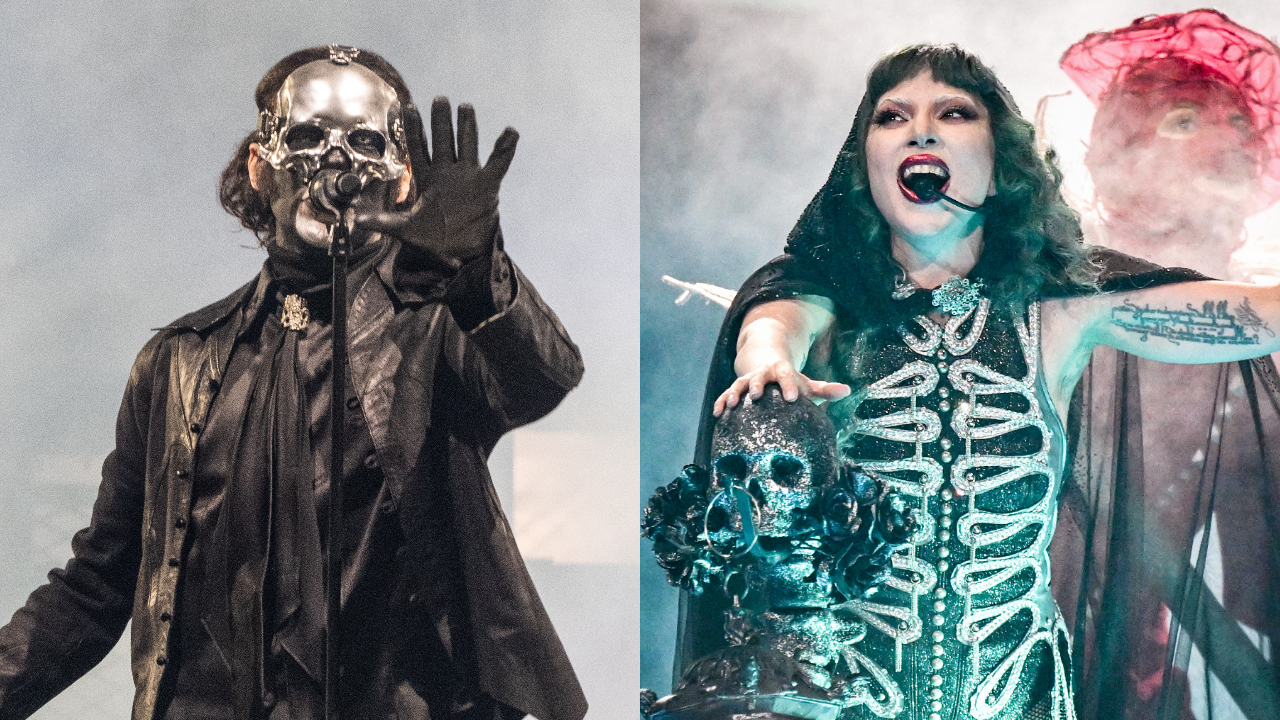BB King Remembered
Few musicians have made as much of an impression on the world at large as BB King. Here, the stars who knew and admired him pay tribute to a true blues icon...

JOE BONAMASSA
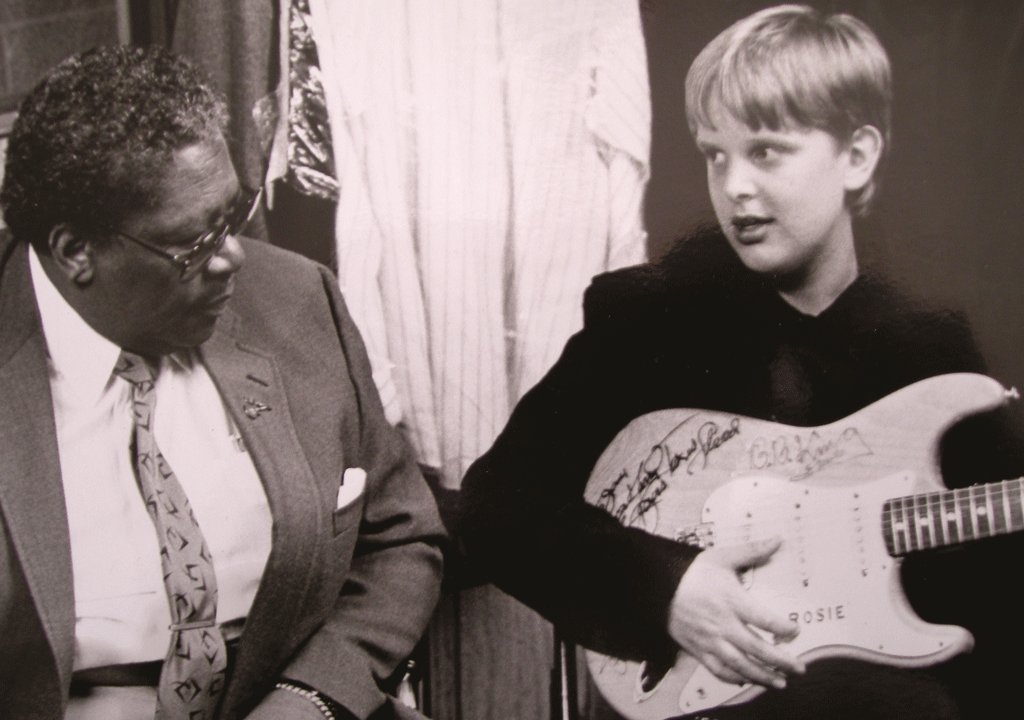
Above: 13-year old Bonamassa gets schooled by the best.
Joe Bonamassa
I met BB King for the first time on May 24, 1990. I was his opening act. I had just turned 13. He was really intrigued with my playing and my style, and why I liked the blues. The summer after that, I did 10 shows with him over the school vacation – and the teachers didn’t believe me! I had to prove it. Luckily, the newspaper picked up on it, and wrote an article about the tour.
“I started doing some reflecting, adding up all the tours, and I probably did between 55 and 65 shows with him over the course of 25 years, as an opening act or on a festival. It’s insane.
“My favourite memory of BB King? They’re all great, but the one that would make people go, ‘Wow’ is when we were doing his 80th birthday celebrations. This was back when iPods were still new, and I’d just gotten one. I’m so painfully inept with electronics, and I was on his bus, just saying hi, and he was like, ‘What are you listening to?’ And I said, ‘Well, nothing, because I can’t figure out how to get tunes from my computer to the iPod.’
“So BB King is like, ‘Oh, you just do it like this.’ This is back when you had to highlight them and drag them over to the playlist. And then he showed me how to sync the iPod to the computer. I’m like, ‘Here I am, I’m 26 years old, I’m supposed to be showing an 80-year-old how to do this. And he’s showing me.’ So BB King showed me how to drag./o:p
Sign up below to get the latest from Classic Rock, plus exclusive special offers, direct to your inbox!
“Plus, he sang on my album [Black Rock]. We weren’t in the same studio. I had cut my part before. Y’know, Mr King was old at that point, so we went to him, did it in Vegas. His contribution to Night Life was great. It’s one of my favourites. The best part of that whole session was the rap. Kevin Shirley [producer] got to hang with BB and he just started talking before the take – and Kevin got it all on tape. He was telling this story about being in Vegas and Frank Sinatra telling the casino bosses, ‘That’s BB King, you let him in the casinos.’ It’s just, like, historic stuff. That guy lived an incredible life.
“He was an institution. It’s a devastating loss. BB King is the blues. The blues is BB King. There’s only one BB King. He’s irreplaceable. But we’re starting to see this more and more now. It’s, like, Johnny Winter dies. Jack Bruce dies. Ben E King dies. And now BB King. These are irreplaceable titans of the music that we all know and love.
“He was the most genuine, humble guy – but he could also be a bad-ass. That’s a great combination. Y’know, a singer that was on the level of Frank Sinatra or Nat King Cole. A guitarist that rewrote the book. It’s like, the circumstances that created an artist like BB King don’t exist any more. Like, clawing your way out of Indianola, Mississippi, making it to Memphis, and then having to deliver. He grew up in an era when you had to sing in key. You had to nail it. You really had to play. You were cutting records live.
“I was on stage in Seattle when I guess he passed. I’d left my phone on charge, and you know something is happening when you’ve got, like, 30 missed calls and a hundred text messages. I was, like, ‘What’s happened?’ Then I heard it on the news. And then it starts to hit you. That you’re never gonna hear [nephew] Walter King go, ‘Ladies and gentlemen, the king of the blues – BB King!’ ever again. It’s really the end of an era.”/o:p
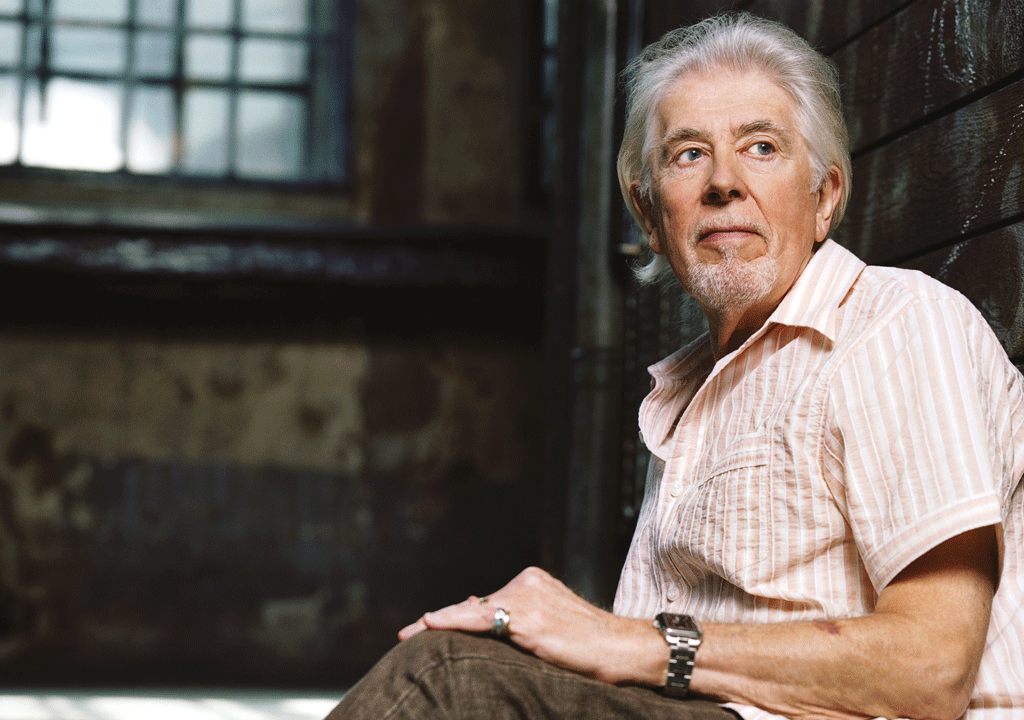
Tour buddies: John Mayall befriended King on the road in the 60s.
JOHN MAYALL
The first time I heard BB King was on a record. It was a 78, Three O’Clock Blues, which I had access to from a friend of mine in 1956. When I first heard that single, the thing that struck me was his voice. It was just incredible that range that he had, and purity and the power. It was a different kind of blues that I hadn’t heard before, or done quite so well.
“We played with BB so many times over the years. We opened up for him on many of his tours. We became good friends right from the 60s onwards. When we played his club in New York, if he wasn’t working himself – which was kinda rare – he’d come and visit and sit in the dressing room and chat while we were waiting to go on. It was always a great pleasure for me to bring my guys into his dressing room and have them meet him.
“This has been said many times before, but if I had a recommendation to get people started off on BB’s music I would definitely suggest Live At The Regal. It’s a live recording, he’s on top form… his vocals and rapport with the audience are quite amazing. It was a record that Eric Clapton and I more or less discovered at the same time. It’s a special record.
“The remarkable thing about BB is that he was so prolific, especially on the road. His main message was to spread the word of the blues. He certainly did that.”
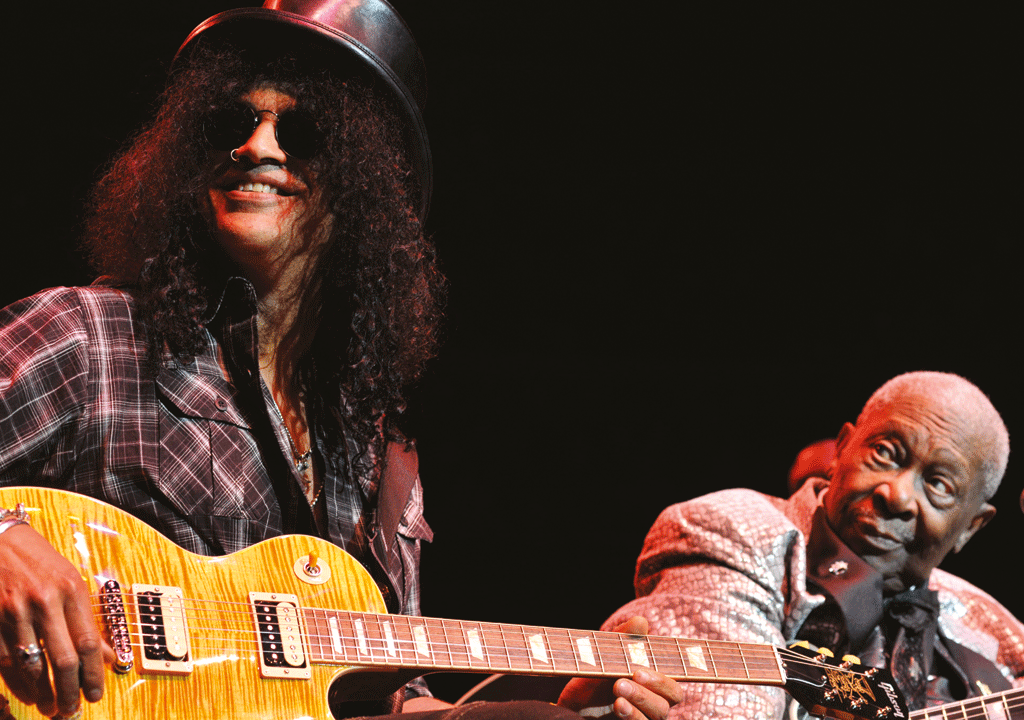
The metal connection: Slash with his mentor and hero.
SLASH
BB King took me under his wing a long, long time ago. He was as much a mentor as a hero to me. He’s probably my top blues influence. I’ve always liked his particular style – his sound and his phrasing. But as a person he was wonderful.
“He was such a good guy. It was a real shock when I got the text [about his passing]. I was on the east coast at the time, I got this text in the middle of the night from one of BB’s people that I’m friends with. I knew that BB wasn’t doing so well, but I still wasn’t expecting to hear that he’d died. I was speechless. Completely shocked. I started to think about it all the next day, and the fact that he died in his sleep – at least that was something, under the circumstances, that you could be happy about, that there wasn’t a lot of suffering.
“He just had such a great, unique and individual personality as a blues player. You know, there’s a lot of guys out there playing blues. And you’re talking about the basic three chords and a certain kind of style that you recognise as being blues, and he just had his own voice that was uniquely his. It was super fucking soulful and the stuff that he played on guitar, along with his vocals – that combination of the two – was beautiful.”
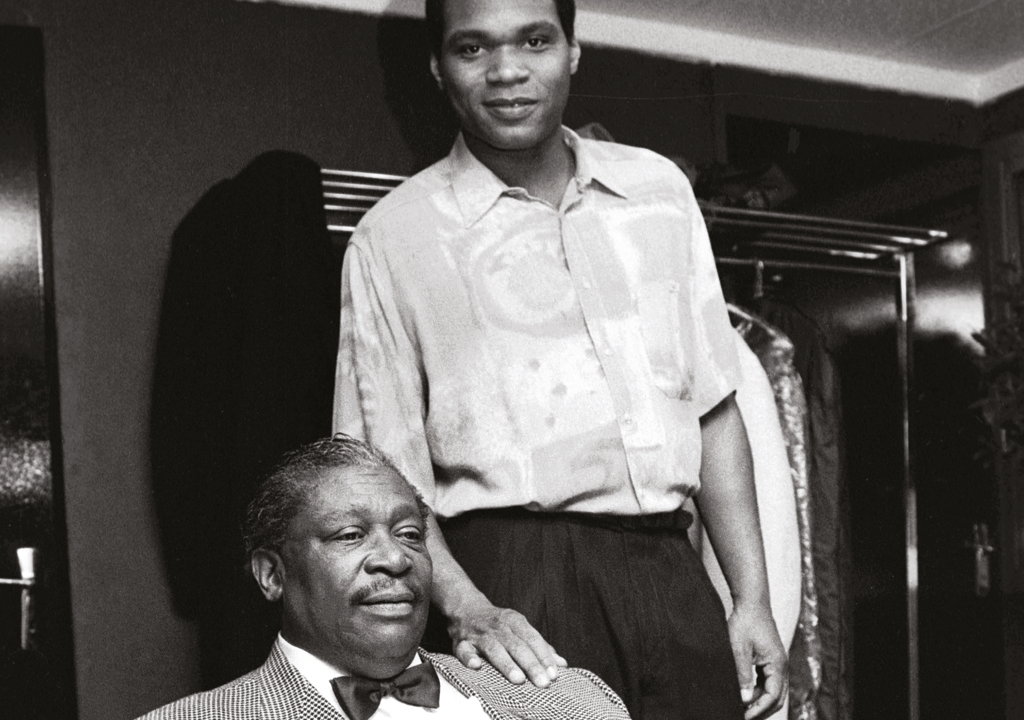
Above: Cray and King: “He was an ambassador to the world…”
ROBERT CRAY
It wasn’t until I’d been playing the guitar for about five years that I gave BB King’s music proper attention. I was 15 years old, and it was a time when I was wide open to getting into the blues – and BB King was the guy. What I dug about him was that he would say a lot with just a few notes. But then you’d go back and listen to his earlier stuff, and he was burning it up just as well as the younger guys who followed.
“Just the other day, I pulled out some old LPs and I was listening to songs like Three O’ Clock Blues live. There’s women screaming in the background: it’s like the teen idols of today. He had his full orchestra, and he’s blazing it on guitar, and the vocals were just incredible. Or songs like I’ve Got Papers On You Baby, where he just tears up the guitar.
“The first opportunity we had to work with BB was in Santa Rosa. We did our opening spot, and BB hadn’t even arrived at the time we had taken the stage. The dressing room facilities were minimal, y’know, but I had a room to change in, so I left my belongings in there. When I got off stage, I came back and I wanted to go change out of my stage clothes, and I wasn’t allowed entry into the dressing room. This big minder said, ‘No, it’s BB King’s room now. Sorry, you can’t go in there.’ I was just livid. I was so mad. But eventually, I was let in, and I got to meet BB – and he calmed me down!
“We met lots of times over the years. We were on a lot of the same bills. We also had the opportunity to do the Blues Summit album. Myself, Richard Cousins [bassist] and Bobby Murray [guitarist], we all grew up in high school, played in bands together, had dreams of being blues musicians and playing with BB King. So when we were all together for Blues Summit, along with John Lee Hooker and everybody like that, we’d walk up to one another in the studio and go, ‘Can you believe that we’re here…?’
“BB had time for everybody. He was just so personable, and really open to everybody. He’d be signing autographs and taking pictures right up to going on stage. We’d do shows with him and he might be camped out in his bus before going on stage. I’d finish our gig and if there’d be half an hour in between, I’d go out and say hi to him, and he’d say, ‘Come on in, Robert!’
“The biggest bluesman of all is gone, and we’ll miss him. I got the chance to visit him [before he died]. We were playing two nights in Las Vegas, and my tour manager and myself went over to BB’s house. I looked back at my itinerary for the exact date – it was March 1. He sat up in his bed and we chatted for a while, watched TV and stuff. He’d lost a lot of weight, but he looked pretty good, he was really friendly and everything like that.
“The world knew BB King. When I went to his house, I saw pictures of him with the Pope, a wall of him with presidents and him with Elvis Presley or Frank Sinatra and whoever else. BB King was the ambassador to the world. It puts a smile on my face to be able to talk about him. It makes you feel good to remember the good things about the man, y’know?”
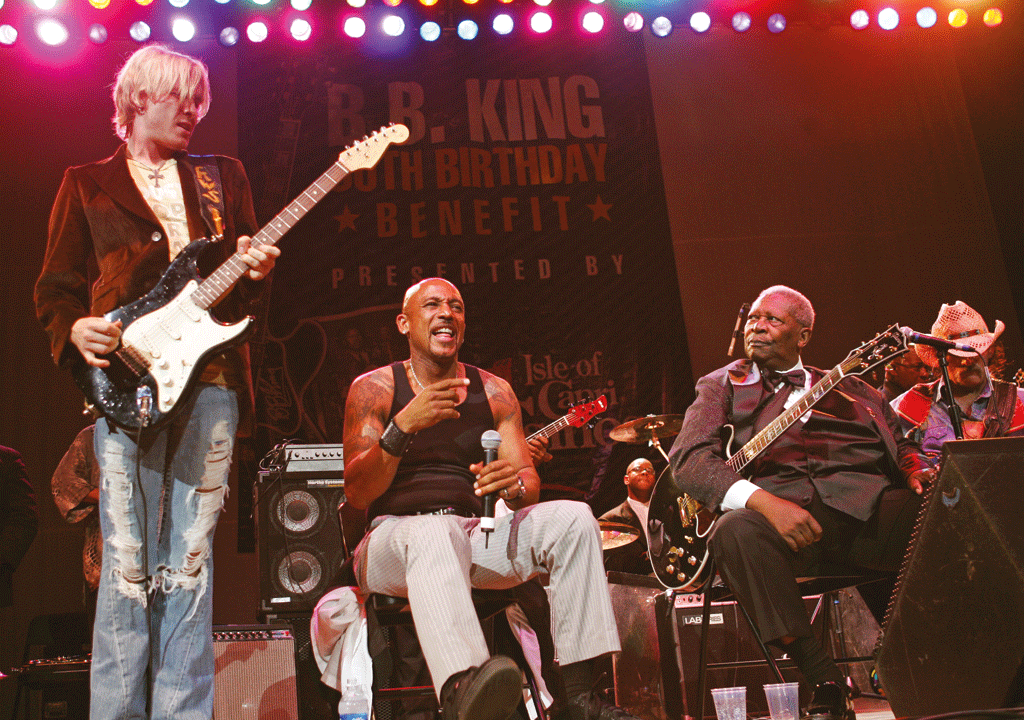
Above: Kenny Wayne Shepherd and Montel Williams at Mr King’s 80th birthday bash.
KENNY WAYNE SHEPHERD
I remember the f irst time I met BB King. I did a tour with him when I was 15 years old. What was even more incredible was the way he welcomed me in and treated me as if I was one of the guys. He had so much advice about the road, and the dos and the don’ts, but he always spoke to me like I was a peer. The last show was on my 16th birthday, and we spent a lot of time together that evening, and established a relationship that would go on for decades.
“We covered The Thrill Is Gone together for Ten Days Out [2007], which was an album and DVD made while we were going through the south of the United States, playing with these blues musicians. BB was one of the people we stopped by and played with. That particular night was amazing, because coincidentally, it was my birthday, so right before the cameras started rolling, he called me up on the tour bus and sang me Happy Birthday. The [film-makers] just missed it, so they were like, ‘Oh, can you do that again for the cameras?’ And he was like, ‘No, that was a private moment for me and Kenny to share.’ Just a few hours later, we went on stage in his hometown of Indianola, Mississippi, in one of the last remaining juke joints from the chitlin’ circuit, a place called Club Ebony. The whole thing was just incredible.
“I remember the last time I played with him, maybe a year and a half ago. He was coming through town and I just happened to be home. He was playing at this place not far from my house called The Canyon Club, so I stopped by. I just wanted to say hello, like I always did, but he’d almost always call me up on stage to play with him. I came totally unprepared. I had to borrow a guitar from the club owner – a Les Paul that didn’t belong to me – and some random amplifier. I didn’t even have a pick. But it was a lot of fun.
“BB King was the only guy who ever intimidated me on stage, just out of sheer awe of what he is and what he represents. I just had so much respect for him that every time I played, I never felt like I did my best, because I was always holding back. I never, ever wanted to overdo it or be disrespectful. A lot of guys, they get up on stage with somebody, and they think that’s their big moment to show the world that they’re ‘better’, or something. I never wanted to come across like that. He always had to egg me on, encourage me to play more, because I was always holding back and he could tell.
“But the thing is, he had such confidence about himself, that it didn’t matter to him. Even if somebody got up there and went overboard, it didn’t even faze him. He was never worried about it. I don’t think he had the same insecurities that us other mere mortal guitar players have. I mean, he was the king of the blues. He was very secure in that. So he didn’t feel threatened.
“A massive loss for the blues? Well, yeah, but I’m thinking it’s a massive loss for the world in general, and for music, period. He was an ambassador for the music, and the amount of people that he influenced with his music and his guitar playing and his singing – it’s immeasurable. The ripples will be felt for centuries…”
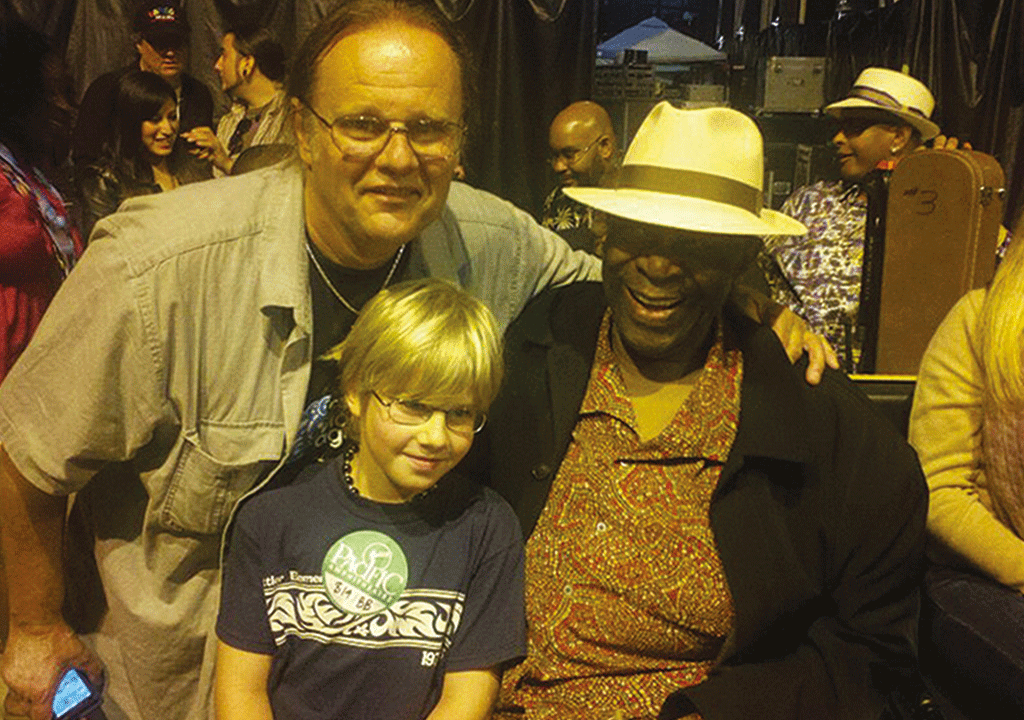
Above: Walter Trout and his son Dylan with King: “He was like a friendly neighbour.”
WALTER TROUT
The first time I saw BB King was in 1970. I was a senior in high school. He opened up in Philly for Delaney & Bonnie with Eric Clapton. And after BB King, Delaney & Bonnie and Eric Clapton should have went home. Because they came on and they could not follow the man. I mean, the guy blew the doors off. He had the entire place in the palm of his hand. He commanded the room. My God, he was fucking awesome. Goosebumps all night. I found myself sitting there screaming. He’d play a lick and everybody would scream.
“BB King was the full package. He had that beautiful, shining light of a soul, down inside, and that came right out when you watched him perform. It was deep stuff. I can play 10,000 notes, and I can’t say as much as that man could with one. That note was like the Gettysburg Address. It was short and sweet, but had an infinite knowledge and wisdom, soul and spirit.
“The first time I met him, I was 17. I worked after school at a department store, in a mall in New Jersey. I was the guy who stocked shelves, put clothes where they were supposed to go, that kind of stuff. Right next to the department store was a record store. One of the guys had been on his break, and he comes in and goes, ‘BB King is in the record store!’ I thought, ‘I may get fired for this’, but I just walked out the door, right into the record store. BB King was there with another guy, looking at records. I went up to him – ‘Mr King?’ – and told him, y’know, I was playing the guitar. He talked to me for about an hour, while I asked for advice, told him which of his songs I loved. He put his hand on my shoulder, talked to me, encouraged me.
“Later, I was with [John] Mayall and we did gigs with him. He loved to talk to people and relate to them, look them in the eye. If you ever said to him, ‘I think you’re the greatest bluesman there is’, he’d kinda get embarrassed and say, ‘I’m just a guy trying to make a living playing the guitar.’ He would downplay it.
“After I left Mayall, we had a six-hour layover in Stockholm one time, and I was just walking through the airport, bored and looking for stuff to do. There was this gate area that was empty, but back in the far corner was BB King, sat reading a book. I went, ‘It’s fucking BB King, man!’ I walked over and said, ‘Excuse me, Mr King, but I used to play with John Mayall.’ And he went, ‘Yeah, Walter! Hey man, siddown!’ So I sat there with him, again, for an hour, as we laughed and joked. Oh man, what a guy, y’know?
“He was one of the most humble, beautiful souls. And that beautiful spirit was genuine. It was not put on. There was one time I opened for BB at the local amphitheatre and my son Dylan was running around. BB put him up on his lap and they had a great talk. Afterwards, I said to him, ‘Dylan, you just sat on the lap of BB King. He’s not just the greatest bluesman of all time – and I won’t listen to arguments about that – and he’s not just a figure who will be legendary throughout time. The guy’s a fucking icon. He’s almost not in the league of being human.’ And Dylan said to me, ‘Yeah, but when you meet him, he’s just like a friendly neighbour.’ And that’s what he was. He had no ego. He was the most humble, kind, beautiful human being.”
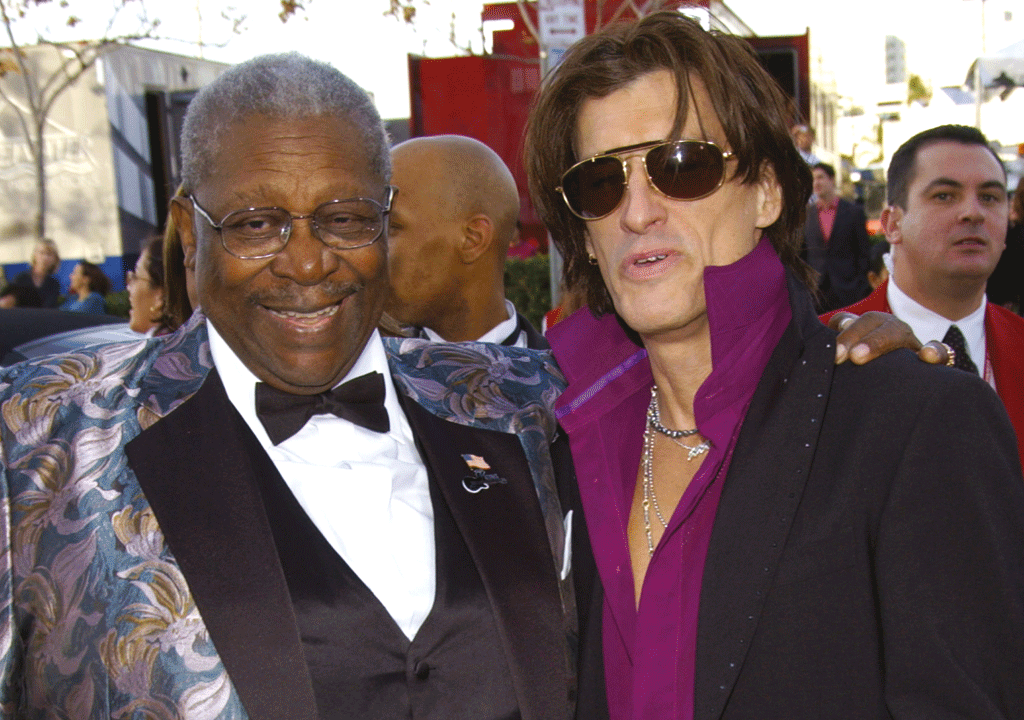
Above: Aerosmith’s Joe Perry indulges in some guitar talk…
JOE PERRY
I remember when I first heard BB King’s music. It was right around the time when I first started. This was, like, ’67 or ’68, and there was basically a social revolution going on. They had these places called head shops – I don’t know what you’d call them in England. But basically, you went there to buy Indian scarves, incense, bell-bottoms, all that kind of hippie stuff.
“Part of the sound that everybody was into – because it was so rebellious – was the blues. This was when the English blues guys were coming to America and telling everybody that these guys were still around. It opened up a whole new era for a lot of these blues guys. So very often you’d go into one of these head shops and that’s what they would be playing. I can clearly remember going into one once and this amazing music was coming out. I asked, ‘Who’s that?’ and they said, ‘It’s BB King’, y’know?
“I can remember seeing him play at some of the clubs in town, in my early days. But I met him when I did that film, Lightning In A Bottle [2004]. It was a tribute to the blues, y’know, and Martin Scorsese brought everybody together. Backstage, everybody was hanging around and young guys were in awe and getting to hang out with guys like BB King. It was just unbelievable.
“Over the years, I’ve been fortunate enough to meet a few of those guys. Some of them were pleasant. Some were a little prickly. But BB stands out as someone who was really kind and nice. I can remember talking to him for quite a while. And I always remember, while I was talking to him, he kept on playing. We talked about our guitars, y’know? Because I had recently had a guitar built based on his model, the Gibson Lucille. So we had that in common. I was asking him stuff that he’d probably been asked a thousand times. But the thing that struck me the most was that he was just a really nice guy. You could see why he was able to cross over like he did.
“I think the way that he learnt how to play guitar was by listening to the old blues and jazz singers, and he became able to use his guitar as a voice. It was almost like he was speaking to you. I remember hearing about the time when he was playing with U2 [for 1988’s Rattle And Hum] and he said, ‘Well, I’m not too good with chords.’ But it just showed how identifiable his playing was. He got it across like nobody else ever has.
“Do I hear his influence in the way I play? Well, I hope so, because it’s all about getting a point across. And you’d be surprised how difficult that is. That’s how we all do it: we listen to the guys who went before us and learn from that. And with BB’s style, I mean, he could say so much with two or three notes. You didn’t have to be all over the place to really get a feeling across, and that was the most identifiable thing about his playing.
“Quite a few of the iconic blues players have passed away in the last couple of years. BB King was still going out there and gigging. He was also one of the few blues players that were able to cross the line. He had songs that were hits, in a world where you didn’t hear much blues if you were listening to your average radio station. So he was definitely outstanding as far as that goes. The thing is, y’know – he was one of the groundbreakers.”
